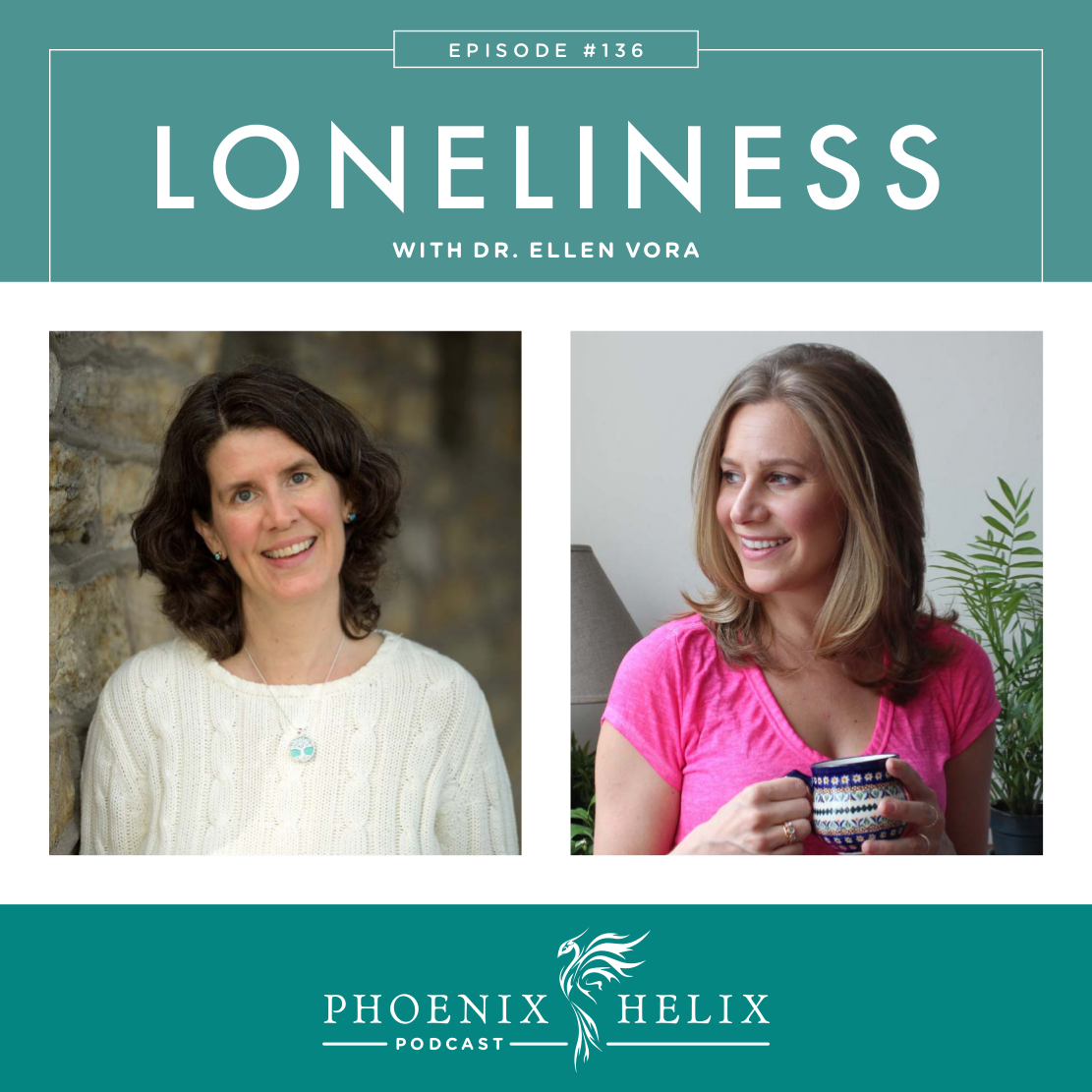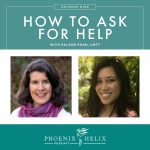The Health Impact of Loneliness
When we feel lonely or isolated, it can seem like we’re the only person experiencing it, yet loneliness has become an epidemic affecting millions. Living with chronic illness can be an especially isolating experience, and it all becomes more poignant around the holidays. In addition to being emotionally painful, loneliness also carries health risks. It’s been compared to smoking 15 cigarettes a day for its negative impact on health and longevity. But loneliness isn’t a life sentence. In this podcast episode, we share practical tips for overcoming feelings of loneliness and expanding our social connections again. My guest is Dr. Ellen Vora. She is a psychiatrist who takes a functional medicine approach to mental health.
Listen to the Show
- Subscribe to my podcast through your favorite podcast app: iTunes, Stitcher, Google, TuneIn, Spotify, Amazon, etc.
- You can also listen to the episode right here through the player below, and if you subscribe to my newsletter you’ll get notified of future episodes.
Podcast: Play in new window | Download
Show Notes
- Intro (0:00)
- Thank You to Our Podcast Sponsor – Paleo on the Go (2:09)
- A frozen meal delivery service, 100% of their menu is compliant with the elimination phase of the paleo autoimmune protocol (AIP). They have over 5o items, including entrees, side dishes, broth, AIP-friendly bacon, and desserts.
- Use the code PHOENIX for 10% off your first order.
- Black Friday Sales (3:40)
- If you’re listening to this podcast live, there are some amazing sales happening in the Paleo Autoimmune community this weekend. Go to my blog’s home page to get all the details.
- Meet Dr. Ellen Vora (4:48)
- Sound note: Dr. Vora lives in New York City, and you will occasionally hear some city noises in the background during this interview.
- Dr. Vora is a psychiatrist who takes a functional medicine approach to mental health. She became disenchanted with her conventional medical school training which limited her treatment options to diagnosis and medication. She wanted to help people thrive. This coincided with a personal health crisis that also left her disappointed in the medical care she received. She started pursuing education in Chinese medicine, nutrition, and functional medicine, and applied those principles to her own life and also her professional practice.
- Defining Loneliness (7:28)
- Dr. Vora’s favorite definition is by researcher, Steve Cole: “A distressing feeling associated with discrepancies between one’s desired and actual social relationships.”
- Other definitions for loneliness are a feeling of isolation, not belonging, or lacking companionship.
- Loneliness and isolation aren’t the same thing. You can feel lonely within relationships. And you can be alone without feeling lonely.
- Health Risks of Loneliness (9:40)
- They’re substantial. Loneliness increases the risk of plaque in our arteries, depression, anxiety, disrupted sleep, cognitive decline, diminished motor function, inflammation, immune system dysfunction, and mortality.
- From an ancestral perspective, it was very high-risk to be isolated from the tribe because it was almost impossible to survive on your own. In modern life, that connection might be still be at play, where our bodies respond to social isolation as a physical threat.
- Resource: Summary of the research.
- Is Loneliness Becoming More Common? (12:49)
- The average size of social networks has shrunk by 1/3 in the past 30 years. People used to live in community settings surrounded by family. It’s much more common to live alone now, with family spread out across different states and countries. Church attendance has decreased and so has volunteerism. Many people also now work from home.
- Social media fools our brains into thinking we are meeting our need for social connection, but Dr. Vora likens it to artificial sweetener. Superficial connections online aren’t the same as deeper, in-person connections. Yet social media is addictive and claims our free time, so we think we’re too busy to make plans with people in real life.
- Resource: Demographics of Loneliness.
- The Dose-Response Effect (15:16)
- For every increase in isolation, there’s an increased health risk, but the reverse is also true.
- Baby steps toward overcoming loneliness can immediately benefit health. One good-quality social interaction sets off a different chemical cascade in the body, increasing oxytocin, decreasing cortisol (the stress hormone), giving a sense of meaning, and encouraging further efforts toward connection.
- Baby Steps to Overcoming Loneliness (16:32)
- Read/Watch Brené Brown and her work on shame and vulnerability. Fears surrounding those things are often what keep us from connecting with others, yet both are part of the human condition. You aren’t the only person feeling this way, and you aren’t “less than” other people. (Resources: Brené’s Books, TED Talk, and Netflix Special.)
- Social anxiety often stems from a lack of social skills. Many of us talk non-stop when we’re nervous. Asking people questions and listening are a better way to have a meaningful social encounter. (Resource: How to Win Friends and Influence People.)
- Send a gratitude letter to someone you appreciate or love, letting them know how you feel. This strengthens the relationships you already have.
- Become the host for activities that interest you. The people who show up will share your interests.
- Lower the barrier to hosting. You don’t need a pristine house, a fancy meal, and a big event to invite people over. Keep it as simple as you can – let people meet you where you are, and it takes the pressure off your guests as well.
- Chronic Illness & Social Connection (26:14)
- It can often feel like autoimmune disease is a barrier to social connection, with invisible symptoms people don’t understand, dietary needs that go against the mainstream, and varying wellness and energy levels that make plans difficult.
- The most important thing is open communication. Have 1:1 conversations with the people who matter most to you. Tell them that you value their friendship and want to spend time with them. Explain that your symptoms are variable, and sometimes you need to cancel plans at the last minute, but assure them that you aren’t trying to avoid them. Rather, it’s important to you that you find ways to stay in each other’s lives.
- When it comes to food, listen to Episode 45: Social Lives on the Paleo Autoimmune Protocol, for lots of tips on how to navigate food-related events, and creative ideas for non-food ones as well.
- AIP Meetups are a great place to meet like-minded souls.
- Show up to plans when you can. You don’t need to look or feel perfect, or even stay the entire time. The importance is the social connection.
- Meeting New People (32:24)
- It’s a numbers game. Don’t take rejection personally. Some people have busy lives, but others are looking for connection and new friendships. Each time you respond to rejection with resilience, you’re proving your own self-efficacy.
- Choose settings that show a shared interest, if possible.
- Then, strike up a conversation. It doesn’t have to be a big deal. It can be a small question. It’s not about the words – it’s the intention that shows someone you are friendly and kind and open to getting to know them.
- Get comfortable with being uncomfortable. Don’t let discomfort stop you from approaching someone new. Social anxiety and awkwardness are common human feelings. It’s not a flaw in you that makes you unqualified for friendship. Embrace your own awkwardness and forgive other people their social awkwardness as well.
- While intimidating, this can get easier with practice. And having a sense of humor about it all helps!
- Self-compassion is a great companion practice, learning to replace your inner critic with a friendly voice instead.
- Thank You to Our Podcast Sponsor: Simply AIP (38:31)
- Update 2023: Simply AIP is no longer in business, but you can find AIP products at Fully Healthy.
- Meaningful Connections Over Distance (39:45)
- Sometimes people we care about move far away. And sometimes our health limits in-person encounters. There are ways to stay connected over distance.
- Phone calls: Dr. Vora loves going for a long walk and calling someone she misses.
- Social media: It can help or hurt, depending on how we use it. We want to avoid using it addictively in a way that makes us feel “icky” afterward. Be aware of how much time you spend there, and how different social media platforms make you feel. It’s easy to get caught in a comparison trap, where other people’s online triumphs make you feel worse about your real life challenges. Only follow the accounts that lift you up, and unfollow the ones that make you feel worse. If an entire platform makes you feel worse, close your account and choose a different one, or take a social media sabbatical.
- Slack: This is a private social media platform that’s commonly used in businesses, but can be used personally as well. Dr. Vora uses it to stay connected to a group of friends who used to live together in NYC and now live far apart. They have a private group on Slack where they interact daily. She also started an invitation-only new mother group, and she has been able to set the tone to be supportive rather than judgmental. Both of these online groups enrich her life.
- Pets as Companions (45:54)
- For many people, pets soothe feelings of loneliness and create a deep feeling of connection. Not surprisingly, owning a pet has proven health benefits as well.
- Resource: Can Pets Support Autoimmune Health?
- Loneliness Within Relationships (46:42)
- This can sometimes be the most painful kind of loneliness. When you have a family, or a romantic partner, or friends, yet still feel isolated an disconnected.
- It’s a complex area with many potential factors, but Dr. Vora shared some general advice that can be helpful.
- Speaking up for you needs in a non-confrontational way is important. Dr. Vora recommends the book: Non-Violent Communication.
- Learning the other person’s love language (and your own) can also be very helpful. People express affection in different ways, and knowing this greatly enhance feelings of connection in all relationships – romantic or otherwise. Dr. Vora recommends the book: The 5 Love Languages. (There are now a series of books on the topic.)
- Psychadelic-Assisted Therapy. This is a new and controversial area but is showing great promise in disrupting “stuck” mental patterns and shifting mindsets. Dr. Vora thinks it has potential for people with PTSD, OCD, Social Anxiety, Panic Disorder, and Depression. She recommends the book: How to Change Your Mind.
- Loneliness in the Holiday Season (52:03)
- We often have a false expectation of what the holidays “should” be like, and a false belief that the majority of people get to have an ideal holiday. Replace that expectation with curiosity. Understand that the season might have challenges but also joys, and see it as an opportunity to learn more about yourself. What triggers you and what supports you during this time?
- Mindfulness can be very helpful. So can self-compassion.
- We often regress during the holidays, because we return to our childhood home or see people we knew when we were children. Be aware of this potential. Put love into your relationships, but also set boundaries as needed. And give everyone else some grace as well; the holiday season is challenging for most people.
- In the Northern Hemisphere, the days are shorter which makes some people vulnerable to seasonal depression. Light therapy can help.
- People often overindulge in alcohol and sugar during the holiday season, which puts us on a physiological rollercoaster. Be aware of this, and try to make mindful choices. Always have a satiating snack with you to help stabilize blood sugar in the midst of your activities and interactions. There’s a strong connection between blood sugar and mood.
- Schedule joy into the season literally – put things on your calendar that comfort or uplift you. (Resource: 101 Ways to Treat Yourself That Have Nothing to Do with Food.)
- Resource: Phoenix Helix Holiday Series.
- The Intersection of Autoimmunity, Self-Care, and Loneliness (1:00:10)
- One of the health risks of loneliness is immune system dysfunction, and the experience of chronic illness can also be isolating, creating a circular connection.
- But in the same ways that self-care can maximize autoimmune health, it can also lay the foundation for social resilience. The better we feel, the more energy and motivation we have for seeking in-person connections.
- That said, sometimes autoimmune flares happen no matter how well we care for ourselves. Radical acceptance is much more helpful in those moments than resentment. Flares give us an opportunity for reflection: is there a message our body is trying to send regarding a change it would be good to make in our lives? It’s also an opportunity for unconditional self-love as opposed to only loving ourselves when we’re healthy.
- Resources:
- Outro (1:04:34)
- Dr. Ellen Vora works with patients 1:1 in New York City and also works with remote clients. She also facilitates an online group which is a great opportunity to get support and build social connections at the same time: Holistic Approaches to Mental Health.
- Special Note: Many listeners have told me they’d like to leave a positive review in iTunes but don’t know how to do it. I finished today’s podcast with a step-by-step tutorial, and I’ve also included a written tutorial below. If you take a minute to do this, I would be very grateful!
- Eileen (your podcast host) is the author of multiple books, written to help people thrive with autoimmune disease. Learn more on the Books Page.
- If you like this podcast, follow or subscribe through your favorite podcast app. You can also subscribe to Eileen’s biweekly newsletter.
- Check out the entire archive of podcast episodes.
You May Also Be Interested In
Spreading the Word
If you like the podcast, please leave a positive review in iTunes. It would mean the world to me, and also helps others find the podcast. Here are some quick instructions using your iPhone:
- If you are already subscribed to my podcast: (1) Click the purple podcast icon. (2) At the bottom of the screen, click Library. (3) At the top of the screen, click Shows. (4) Click the Phoenix Helix podcast image. (5) Scroll down the page, and you’ll see Ratings and Reviews. Scroll down a little bit more and click on Write a Review. This will bring up the review screen. Tap 5 stars (if you love the podcast), and then click in the title box, and it will bring up the keyboard. Enter a title and short review. (6) Click Send in the upper right corner. (7) Thank you! Positive reviews give the podcast a higher search ranking in iTunes, helping people find it and letting them know it’s a quality podcast and worth their time to listen.
- If you haven’t subscribed to my podcast: (1) Click the purple podcast icon. (2) In the lower right corner, click the magnifying class. (3) Type Phoenix Helix in the search box. (4) Click the podcast cover in the Show list. (5) If you’d like to subscribe, click the + sign at the top of the screen. (6) To write a review, scroll down the page, and you’ll see Ratings and Reviews. Scroll down a little bit more and click on Write a Review. This will bring up the review screen. Tap 5 stars (if you love the podcast), and then click in the title box, and it will bring up the keyboard. Enter a title and short review. (7) Click Send in the upper right corner. (8) Thank you! Positive reviews give the podcast a higher search ranking in iTunes, helping people find it and letting them know it’s a quality podcast and worth their time to listen.









Loved this episode! During my worst flare which lasted about 5 years, I found the healingwell.com forum and it saved me. I was so isolated being at home or in the hospital and most of my friends stopped talking to me. I made a lot of online friends who had the same disease as me. I wasnt able to go out socializing or have a job so the internet was my only connection to others. I am in remission and working again but am still thankful I had that great forum. There are many diseases that the forum has groups for. I recommend it to anyone who has a chronic illness.
Joanna, thank you so much for sharing that resource. It’s wonderful when authentic connections can be made online. Wishing you a beautiful, healthy, and supportive holiday season.